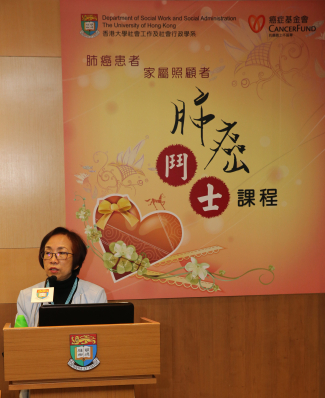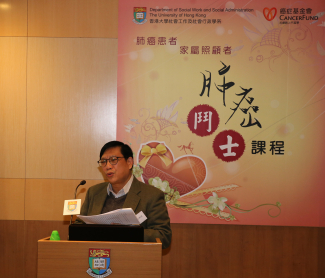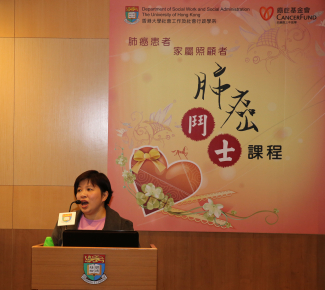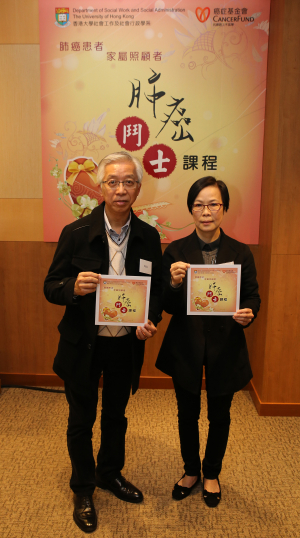Media
Co-organized by the HKU Department of Social Work and Social Administration and the Hong Kong Cancer Fund
The first "Lung Cancer Fighter Course" for lung cancer patients and family caregivers
29 Feb 2016
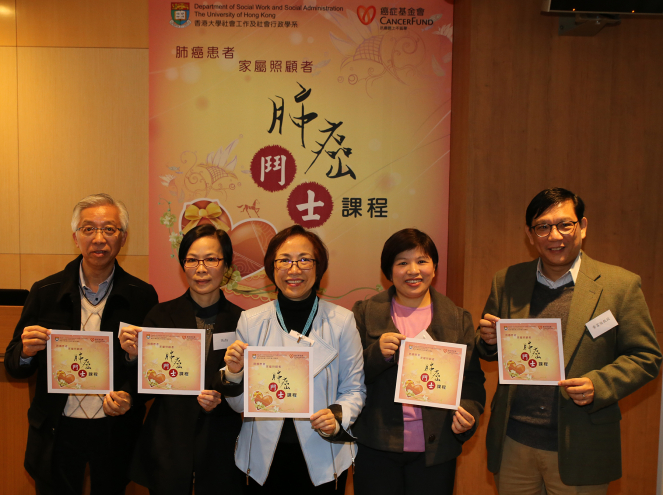
(from left) Caregiver Eddie, previous cancer fighter course patient Ruby, Professor Cecilia Chan, Ms Chow Sau Fong (Head of Service, Hong Kong Cancer Fund) and Professor Daniel Wong
Lung cancer is the second most common cancer in Hong Kong with more than 4,000 new cases every year. The mortality rate of lung cancer has been declining over the years due to advancements in medical treatment. Lung cancer patients are having better chance of cure or prolonged survival. In light of this, the research team of Department of Social Work and Social Administration at the University of Hong Kong (HKU) and the Hong Kong Cancer Fund will collaborate to offer the "Lung Cancer Fighter Course" to provide psychosocial interventions for lung cancer patients and their family caregivers, with an aim to enhance the quality of life in their journey against cancer.
The challenges faced by lung cancer patients and their family caregivers in the journey against cancer
Lung cancer patients have to face different challenges including cancer related symptoms (such as cough, shortness of breath, pain, fatigue, and psychological distress) and side effects of treatments (surgery, radiotherapy, chemotherapy and targeted therapies)[i]. Their family caregivers also experience anxiety and other negative emotions. Previous studies conducted by the research team at the University of Hong Kong have shown that the physical and mental health of patients and their family caregivers, such as anxiety, depression, and sleep quality, interact and reinforce each other[ii]. Therefore, providing support to cancer patients only, without addressing the distress of the family caregivers, is obviously insufficient. These researches have also demonstrated that when patients’ coping capacity was enhanced after intervention, not only their aforementioned health indicators would improve, the quality of life of their caregivers would also improve[iii]. These studies shed light on the significance of providing psychosocial support for both cancer patients and their family caregivers.
Effectiveness of the existing psychosocial interventions for cancer patients
A growing number of research findings have confirmed the positive effects of psychosocial interventions as a complementary therapy to medical treatments. Psychosocial interventions refer to a range of non-drugs therapies including individual counseling, group activities, relaxation training, and education on symptom management[iv],[v]. Both international and local literatures have suggested that psychosocial interventions can create positive physical and psychological effects on cancer patients. For example, after participating in psychosocial interventions, patients showed improvement on immunity, reduced pain and depressive symptoms, slowing down of disease progression, lower rate of recurrence and prolonging survival[vi]. Their self-efficacy and skills to cope with disease symptoms were also enhanced[vii]. Study by our team has demonstrated that psychosocial interventions for either patients or caregivers could create positive effects on the other group. In one study, it was found that the majority of the cancer patients reported anxiety symptoms (60%), depressive symptoms (50%), and sleep problems (80%). After the psychosocial interventions, 30% of the patients reported reduced anxiety and depressive symptoms while 60% of the patients reported improvement on sleep quality. Among the family caregivers, a significant portion of them reported anxiety symptoms (40%), depressive symptoms (30%), and sleep problems (50%). Psychosocial interventions significantly improved the health indicators of the family caregivers as well. As the distress of lung cancer patients is in general higher than patients suffering from other cancers, and that their stress would have an impact on their family members, this lung cancer fighter course will be the first systematic integrative service model in providing psychosocial support for both lung cancer patients and their family caregivers. This will also be one of the first world studies of this large scale.
Positive outcome of previous cancer fighter courses
Since 1996, Professor Cecilia L.W. Chan has been co-organizing cancer fighter courses with the Hong Kong Cancer Fund and more than 600 cancer patients had taken part in these courses. These courses were offered to breast cancer and colorectal cancer patients, and effectively enhanced their quality of life and physical strength. The patients were more willing to accept the disease and express their anxiety and worries. They were also more willing to accept the support and care from family and friends, without avoiding contact with people in their social network and the community. The study has also pointed out that enhanced mental health of cancer patients can effectively prevent the occurrence of emotional distress symptoms (such as depression, irritability, anxiety about death)[viii].
Lung Cancer Fighter Course - The first face to face psychosocial interventions for lung cancer patients and family caregivers in Hong Kong
The "Lung cancer fighter course" is the first psychosocial interventions programme designed specifically for lung cancer patients and their family caregivers. The 8-section course includes: medical information, tips on coping with cancer treatment, the mind-body connection, stress management, mindfulness practices, information sharing on diet and coping with side effects of treatments, communication with health care professionals and among family members.
Anticipated positive outcome
We expect that by joining the "lung cancer fighter course", patients and their family caregivers would benefit in the following areas:
|
For patients |
For caregivers |
|
|
Boost the immune system |
✓ |
✓ |
|
Acquire the skills to relieve some symptoms associated with lung cancer |
✓ |
✓ |
|
Develop effective communication with family and health care professionals |
✓ |
✓ |
|
Coping with distress associated with the lung cancer |
✓ |
✓ |
|
Develop healthy eating habits |
✓ |
✓ |
|
Establish positive thinking |
✓ |
✓ |
|
Design of new goals and meaning in life |
✓ |
✓ |
|
Reduce emotional distress induced by caregiving |
✓ |
About the courses
There are Class A and Class B in this programme.
Course dates:
Class A: 6 April 2016 to 18 June 2016 (every Wed, Thu or Fri pm)
Class B: 6 April 2016 to 18 June 2016 (every Sat am or pm)
Trainers / Speakers:
A professional team consisting of 26 registered social workers, doctor and researchers.
Venue:
Class A will be conducted at the University of Hong Kong.
Class B will be conducted at cancerlink in Hong Kong Island, Kowloon, the New Territories or the University of Hong Kong.
For more details about the venues and the course, please click here.
For enquiries about the course, please call the University of Hong Kong hotline: 3917 5526/ the Hong Kong Cancer Fund hotline: 3919 7000.
For media inquiries, please contact Ms Melanie Wan (Senior Manager (Media), Communications and Public Affairs Office) tel: 2859 2600 email: melwkwan@hku.hk.
[i] Cooley, M. E. (2000). Symptoms in adults with lung cancer. A systematic research review. Journal of Pain Symptom Manage, 19, 137-153.
[ii] Chan, J. S. M., Ho, R. T. H., Yuen, L. P., Lee, T., & Chan, C. L. W. (2015). Associations of physical activity, health-related outcomes, and patients' confidence in fighting cancer between cancer patients and family caregivers. Psycho-Oncology, 24(2), 186-187, DOI: 110.1002/pon.3874.
[iii] Chan, J. S. M., Chan, T. H. Y., & Chan, C. L. W. (2014). Significant determinants in predicting health-related quality of life among Chinese cancer patient and caregiver dyads in Hong Kong. Psycho-Oncology, 23(3), 397-398.
[iv] Lee, A. M.*, Ho, J. W. C., & Chan, C. L. W. (2010). Efficacy of Psychosocial Intervention in Improving Quality of Life and Psychological Well-being of Chinese Patients with Colorectal Cancer: a Randomised Controlled Trial. Hong Kong Medical Journal, 16(3), 20-24.
[v] Chan, W. H., Richardson, A., Richardson, J. (2011). Managing Symptoms in Patients with Advanced Lung Cancer During Radiotherapy: Results of a Psychoeducational Randomized Controlled Trial. Journal of Pain and Symptom Management, 41(2), 347-357.
[vi] Barrera, I., & Spiegel, D. (2014). Review of Psychotherapeutic Interventions on Depression in Cancer Patients and Their Impact on Disease Progression. International Review of Psychiatry, 26(1), 31-43.
[vii] Porter, L. S., Keefe, F. J., Garst, J., Baucom, D. H., McBride, C. M., McKee, D. C.,…Scipio, C.(2011).Caregiver-Assisted Coping Skills Training for Lung Cancer: Results of a Randomized Clinical Trial. Journal of Pain and Symptom Management, 41, 1-13.
- Hsiao, F.H., Jow, G.M., Kuo, W.H., Chang, K.J., Liu, Y.F., Ho, T.H., Ng, S.M., Chan, C.L.W., Lai, Y.M., & Chen, Y.T. (2012). The effects of psychotherapy on psychological well-being and diurnal cortisol patterns in breast cancer survivors. Psychotherapy and Psychosomatics, 81, 173-182.

